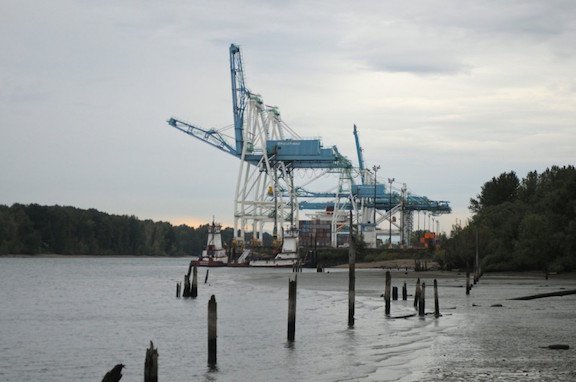forum
library
tutorial
contact

Massive Ships Threaten
Portland's Container Export Prospects
by Mateusz Perkowski
Capital Press, April 28, 2017
|
the film forum library tutorial contact |

|
Massive Ships Threaten
by Mateusz Perkowski
|
Container traffic at the port came to a halt in 2016 after several ocean carriers stopped calling at the facility,
claiming that slow loading and unloading rendered the market unprofitable.
 Increasingly massive container ships threaten the relevance of the Port of Portland's container terminal, where cranes aren't large enough to accommodate the behemoth vessels, experts say.
Increasingly massive container ships threaten the relevance of the Port of Portland's container terminal, where cranes aren't large enough to accommodate the behemoth vessels, experts say.
"In many ways, this is where the market is headed and what we have to contend with in Portland," said Randy Fischer, senior analyst at the port. "It's bigger ships coming in and smaller ships getting pulled out."
Transportation officials painted a sobering picture of the problems facing container shipping from the port during an April 28 meeting with Northwest importers and exporters.
Container traffic at the port came to a halt in 2016 after several ocean carriers stopped calling at the facility, claiming that slow loading and unloading rendered the market unprofitable.
Productivity problems at the port were blamed on a labor dispute between the longshoremen's union and the terminal operator, ICTSI, which began leasing the facility in 2011.
The Port of Portland regained control of the container terminal after ending its contract with ICTSI earlier this year, but carriers must still be convinced to return.
"We have a bit of a black eye in the market right now and we need to figure out how best to fit into the market," said Fischer.
The International Longshore and Warehouse Union is still involved in a legal dispute with the port, though it's less intense than litigation between the union and ICTSI, said Keith Leavitt, the port's chief commercial officer.
As the port devises a plan to lure ocean carriers back to the Terminal 6 container facility, it will also seek to "reset" its relationship with ILWU, he said.
"When we start making our market pitch, they need to be with us," Leavitt said.
Financial turmoil in the shipping industry has reduced the number of major global ocean carrier companies from 20 to 14 even as global freight capacity has surged, Fischer said.
However, the total freight capacity represented by smaller ships has shrunk while the share of new mega-vessels has grown, he said. Of the 12 carriers that service the Northwest, eight have ships small enough for Terminal 6 to handle.
Traditional container exports from the Port of Portland mostly consisted of hay, other agricultural crops and wood products, which were generally of lower value than imports from Asia, such as furniture, shoes, apparel, tires and electronics.
Effectively, exporters were dependent on vessels calling on Portland to offload imported products.
Those ships then returned with lower-value agricultural goods, which was financially preferable than heading back across the Pacific with empty containers.
This dependency on imports complicates the potential for shipping hay and other farm products by rail from the facility.
Terminal 6 has an intermodal railyard that's only been used sporadically in the past but could be used for transloading export containers from trucks onto trains, said Leavitt.
Without container service in Portland, agricultural exporters must truck products to more distant ports in Seattle and Tacoma. Shipping agricultural goods to these cities by rail, on the other hand, would allow them to avoid traffic congestion.
For the idea to work, though, exporters need access to empty containers.
Since Portland isn't a major consumer market, importers were less likely to use Terminal 6 even when ocean carriers were still calling on the facility. That meant fewer containers were available to exporters.
The problem is now obviously worse, since container shipping has halted altogether, Leavitt said.
If there was a reason to bring more containers into Portland -- such as storing empty ones returning from the Midwest -- the intermodal railyard would be more viable, he said.
Related Pages:
Shipping Authority Seeks to 'Adopt' Portland by Staff, Port Strategy, 5/12/16
Here's Why Portland Won't Get New Shipping Container Service Anytime Soon by James Cronin, Portland Business Journal, 5/9/16
learn more on topics covered in the film
see the video
read the script
learn the songs
discussion forum
